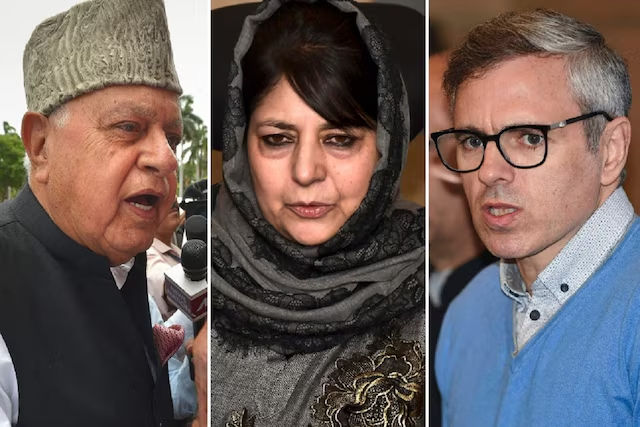The revocation of Article 370 in August 2019 was a landmark moment in India’s history, aimed at integrating Jammu and Kashmir (J&K) fully into the Indian Union. The article, which granted J&K a special autonomous status, was widely considered an obstacle to the region’s development and national integration. Despite this, some political figures continue to demand its restoration, positioning themselves against the Indian government’s efforts for unity and progress. These demands not only contradict the legal and constitutional framework but also carry anti-national connotations, effectively challenging the sovereignty of the Republic of India.
Article 370: A Hindrance to National Integration
Article 370 and related provisions such as Article 35A were enacted to allow J&K temporary special status within India. This provision created a quasi-autonomous state, which many argue delayed J&K’s socio-economic integration into the rest of India. For decades, J&K remained isolated from India’s mainstream, both economically and politically. The separatist sentiments fueled by this special status led to insurgency, cross-border terrorism, and alienation of its people from the Indian state.
The abrogation of Article 370 has paved the way for several reforms and developmental measures aimed at bringing the region on par with the rest of India. Key initiatives in education, health, infrastructure, and political rights (such as the extension of reservation benefits to underprivileged groups) have since taken root. Despite these positive changes, certain political figures and parties continue to harp on restoring Article 370, effectively undermining national unity.
Why Restoring Article 370 is Anti-National
The most alarming aspect of these calls for restoration is that they are fundamentally seditious. The Indian Constitution, following the abrogation, now guarantees uniformity across states and Union Territories. Article 370’s restoration would once again isolate J&K from the rest of India, undoing the gains made since its abrogation. Those calling for its restoration are, in effect, suggesting that a specific region should be placed outside the reach of national laws and governance, weakening the fabric of the Republic.
1. Undermining Sovereignty
Advocating for the restoration of Article 370 undermines India’s sovereignty. It suggests that J&K requires a special status that contradicts the principles of one nation and one law, thereby weakening the structure of the Indian Union.
2. Challenging Parliamentary Sovereignty
The Indian Parliament, through a legal and democratic process, abrogated Article 370. Demands for its restoration disrespect the authority of the highest legislative body and question the constitutional amendment powers exercised lawfully.
3. Fostering Separatism
Demanding the return of Article 370 enables separatist ideologies that have plagued the region for decades. By restoring a provision that kept J&K on a different legal and constitutional footing, these calls reinforce narratives of Kashmir being distinct from India, which is dangerous for national security.
Political Figures Calling for the Restoration of Article 370
Several prominent leaders continue to advocate for restoring Article 370, despite its abrogation:
- Farooq Abdullah (National Conference): Farooq Abdullah, a veteran Kashmiri leader, has repeatedly called for the restoration of Article 370, claiming that the abrogation was unconstitutional. His political stance has garnered criticism for being anti-national, as his demand implies reversing the central government’s efforts for national integration.
- Mehbooba Mufti (People’s Democratic Party): Mehbooba Mufti has been vocal in her opposition to the scrapping of Article 370, terming it an illegal act by the Indian government. Her party’s entire campaign for the upcoming J&K polls revolves around the promise of reinstating J&K’s special status, a move perceived by many as an attempt to further alienate the region from the Indian mainstream.
- Omar Abdullah (National Conference): Omar Abdullah, another prominent regional leader, has asserted that the abrogation of Article 370 violated the constitution and should be undone. This stand, while appealing to certain sections of J&K, has been criticized as divisive and separatist.
Political Motivation Behind Restoration Demands
The calls for restoring Article 370 are not merely driven by legal or constitutional arguments. They are deeply rooted in political calculations aimed at regaining electoral support in J&K. These leaders, who have long controlled the region’s political landscape, see Article 370 as a rallying cry to energize their base, many of whom feel disenfranchised by the recent political changes.
However, these demands ignore the broader national sentiment that favors integration over separation. While it may help certain regional parties in J&K secure votes, the larger consequences for India could be catastrophic, including a revival of militancy, increased cross-border terrorism, and greater instability.
Sedition and Legal Ramifications
By continuing to call for the restoration of Article 370, these political leaders potentially violate Section 124A of the Indian Penal Code (IPC), which defines sedition as any act that “brings or attempts to bring into hatred or contempt, or excites or attempts to excite disaffection towards the government established by law.” Calling for the reversal of Article 370’s abrogation fits squarely into this definition, as it advocates for a return to a legal framework that has been democratically and constitutionally removed.
Conclusion
The call to restore Article 370 is not just a political issue, but a challenge to India’s sovereignty and territorial integrity. Political leaders who continue to advocate for its return are engaging in acts that can be interpreted as seditious, as they aim to reverse the integration of J&K into the Indian Union. While this narrative may serve short-term electoral gains, the long-term consequences for India could be disastrous. For India to move forward as a united, prosperous nation, such divisive agendas must be thoroughly rejected.





